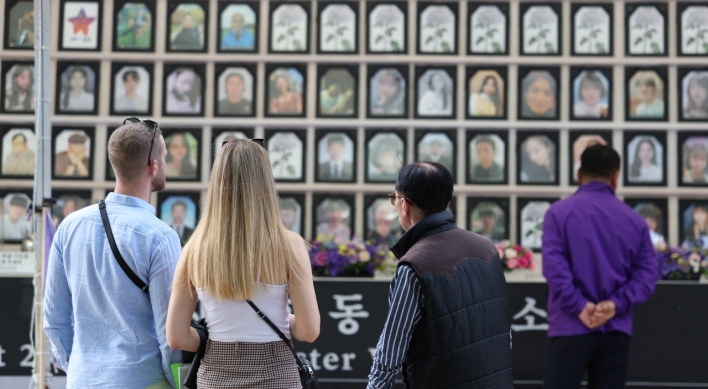North Korea seeks to revive Tumen River development
By Shin Hyon-heePublished : Jan. 13, 2015 - 21:41
North Korea is seeking to revive a moribund project to develop the border areas along the Tumen River and a pipeline to transport Russian gas as part of efforts to build trust and expand economic cooperation with South Korea and other neighbors, according to a report.
The Tumen River Area Development Project, which was later renamed the Greater Tumen Initiative, was launched in 1992 as a joint initiative among China, Russia and Japan and the two Koreas following a proposal a year earlier by the U.N. Development Program. But it had made little progress in the face of military tension, lukewarm participation and sluggish investment by private businesses.
The paper, published in November in the journal by the country’s Academy of Social Science, also indicated the communist country’s resolve to kick-start an ambitious yet dormant project to lay a natural gas pipeline and railway through North Korea to the South.
“The development of the Tumen River and surrounding regions has emerged as a key item for economic cooperation among the countries in Northeast Asia over the some 20 years since the 1990s,” the report reads.
“The establishment of an oil and natural gas pipeline and the Trans-Siberian Railroad and the Trans-Korea Railway is another cooperative project that is gaining attention.”
The report reflects Pyongyang’s efforts to shore up its faltering economy amid international sanctions imposed over its nuclear tests and missile launches. Other multilateral initiatives such as for a special industrial zone in border regions with China remain languid.
Yet it also stressed the need to defuse tension on the peninsula for greater inter-Korean economic cooperation, pointing to international sanctions, U.S. forces in South Korea and the allies’ annual military exercises.
“The North and South need to expel external forces of the U.S. from the peninsula, realize a reunification under the ideology of ‘uriminzokkiri (among our people)’ and carry out tasks that would contribute to a unification,” the publication said.
Seoul, for its part, has set its sights on regional economic collaboration under President Park Geun-hye’s “Eurasia Initiative” through an integrated Eurasia power grid and a logistics network also covering China, Central Asia and Eastern Europe. But it faces mounting challenges such as lingering tension, economic uncertainty and risks of depending on the recalcitrant North.
By Shin Hyon-hee (heeshin@heraldcorp.com)
The Tumen River Area Development Project, which was later renamed the Greater Tumen Initiative, was launched in 1992 as a joint initiative among China, Russia and Japan and the two Koreas following a proposal a year earlier by the U.N. Development Program. But it had made little progress in the face of military tension, lukewarm participation and sluggish investment by private businesses.
The paper, published in November in the journal by the country’s Academy of Social Science, also indicated the communist country’s resolve to kick-start an ambitious yet dormant project to lay a natural gas pipeline and railway through North Korea to the South.
“The development of the Tumen River and surrounding regions has emerged as a key item for economic cooperation among the countries in Northeast Asia over the some 20 years since the 1990s,” the report reads.
“The establishment of an oil and natural gas pipeline and the Trans-Siberian Railroad and the Trans-Korea Railway is another cooperative project that is gaining attention.”
The report reflects Pyongyang’s efforts to shore up its faltering economy amid international sanctions imposed over its nuclear tests and missile launches. Other multilateral initiatives such as for a special industrial zone in border regions with China remain languid.
Yet it also stressed the need to defuse tension on the peninsula for greater inter-Korean economic cooperation, pointing to international sanctions, U.S. forces in South Korea and the allies’ annual military exercises.
“The North and South need to expel external forces of the U.S. from the peninsula, realize a reunification under the ideology of ‘uriminzokkiri (among our people)’ and carry out tasks that would contribute to a unification,” the publication said.
Seoul, for its part, has set its sights on regional economic collaboration under President Park Geun-hye’s “Eurasia Initiative” through an integrated Eurasia power grid and a logistics network also covering China, Central Asia and Eastern Europe. But it faces mounting challenges such as lingering tension, economic uncertainty and risks of depending on the recalcitrant North.
By Shin Hyon-hee (heeshin@heraldcorp.com)







![[Music in drama] Rekindle a love that slipped through your fingers](http://res.heraldm.com/phpwas/restmb_idxmake.php?idx=644&simg=/content/image/2024/05/01/20240501050484_0.jpg&u=20240501151646)



![[New faces of Assembly] Architect behind ‘audacious initiative’ believes in denuclearized North Korea](http://res.heraldm.com/phpwas/restmb_idxmake.php?idx=644&simg=/content/image/2024/05/01/20240501050627_0.jpg&u=20240502093000)






